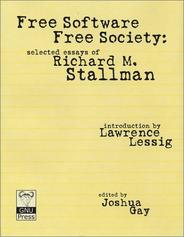
Most of this material is available on-line, but there are a couple reasons to buy the book.
Richard M. Stallman

Free Software Foundation, 2002
ISBN: 1-882-11498-1
$24.95 hardcover
This collection of 21 essays written by Richard M. Stallman between 1984 and 2002 ranges from historical milestones, including the GNU Manifesto, to transcripts of some recent speeches. The introduction is by Lawrence Lessig, Professor at Stanford Law School.
Most of this material is available on-line, but there are a couple of reasons to buy the book: First, the profits go to the Free Software Foundation. Second, having all the essays in one place, with cross-references, updates and notes from Stallman himself, helps readers see the big picture.
Lessig's introduction provides the right start by pointing out that if the Free Software movement is new, radical or revolutionary, it is because it brings to software the freedoms already present in the pre-software world. For example, laws and legal briefs are Free as in Freedom.
The grouping of the essays shows how Stallman himself and the movement in general have been forced to evolve over time. In the beginning it was “only” about the freedom to program, which a minority of people needed when computers were not widely available.
Today, almost everybody's entertainment, work, education and free speech rights depend on computers. The essays in the second and third parts of the book cover why the DMCA and similar efforts are harmful to citizens' rights and a market economy.
In less than 200 pages, we go from “GNU will remove operating system software from the realm of competition” to the problems of copy-restricted media.
A lot of details on how this evolution happened are provided, with several repetitions. Sometimes, these are even funny: the history of the Xerox printer, whose proprietary driver made Stallman mad enough to start the whole thing, is told so often that one can picture proprietary software executives cursing Xerox for not just giving him the darn code.
Coverage of one fundamental issue, free file formats, is missing. Stallman wrote a 2002 essay called “We Can Put an End to Word Attachments” that addresses this need, but it's not in the book.
In general, the book is necessary reading and not only for programmers. I personally disagree with Stallman on certain conclusions and am still trying to decide whether I accept some others or not. But it is crucial that everyone thinks about these problems today, builds his or her own conclusions and follows them. Even if you reject all Stallman's ideas, you must know why, and this book will help.
—Marco Fioretti